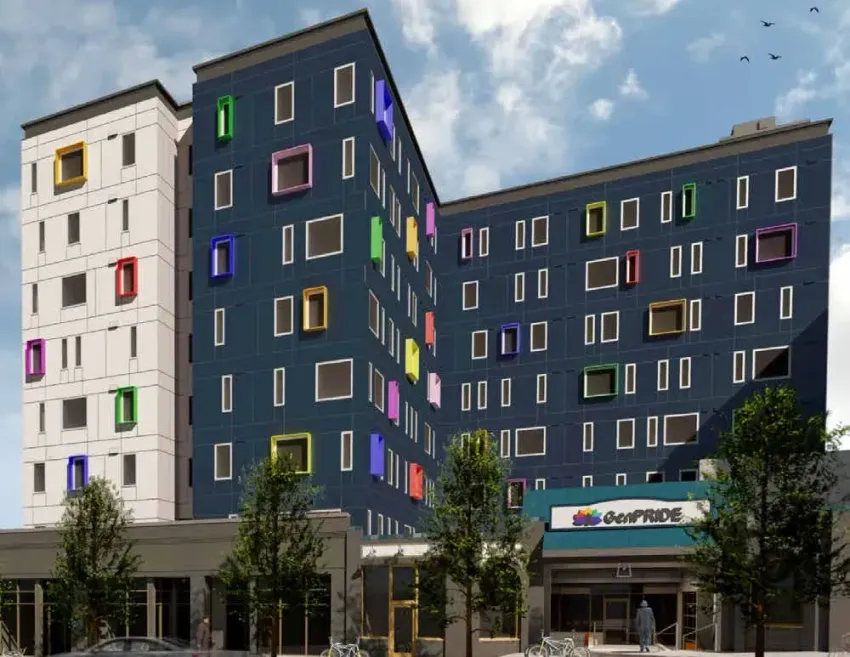This month's edition of the Seattle Gay News is focused on home and finance, and the advancements made by the LGBTQIA+ community in the job and housing market, with an emphasis on Queer-owned businesses and other success stories in our community. However, it cannot be ignored how underrepresented Trans people are in both housing and employment.
According to Advocates for Trans Equality, one in five Transgender people has faced discrimination in the housing market, and one in ten has faced eviction because of their gender identity. The Trevor Project reports that homelessness is higher rate among Trans youth than any other LGBTQ+ group, with 38% of Transgender girls/women, 39% of Transgender boys/men, and 35% of Nonbinary youth experiencing homelessness and housing instability, as compared to 23% of cisgender LGBQ+ youth.
The US Trans Survey shows that unemployment went up 3% in 2022 among respondents to a total of 18%, and that more than one-third reported experiencing poverty.
Moreover, a survey conducted by the Williams Institute suggests that more Trans people are looking to flee to sanctuary states since the inauguration of Donald Trump and the increase in anti-Trans state legislation this year. Seattle is an exceptionally popular sanctuary city among Trans refugees, experiencing a considerable boom in the population of Transgender people from conservative states this year.
Though these statistics aren’t enough to provide a full picture, Trans people are more than numbers on a graph or a percentage. To offer more insight, Violet Kawaguchi of the Kawaguchi O'Connor Initiative (KOI) explained that the group began in November 2024, after the election, in the online forum knockout.chat, when a lot of its Trans participants in conservative states went to a dark place, fearing they were going to lose their healthcare. Several people reported being immediately made homeless after the election because of their parents being emboldened by Trump.

Obstacles
It was then that Kawaguchi began rallying people and moving them to Seattle, as well as directing Trans refugees to public services, such as SNAP and Medicaid.
“We found that a lot of the other orgs aren’t really offering those services, and in our experience, the people who are fleeing do not have the skills to do a lot of this on their own, and certainly aren’t in the headspace to do this on their own, because they just fled a red state, they’re traumatized,” she explained.
As for the hurdles that she has noticed that Trans people face, Kawaguchi said that most of the people she has helped move out here had issues gaining employment: “The median time for someone to get employment has been four to five months at a minimum,” she stated. “A lot of that is due to the job market being really bad right now, especially here in Seattle. If you are not someone who is extremely overqualified, you are not going to get a job very quickly, [which] is what we noticed, especially for Trans people, who experience additional bias and discrimination compared to the average person. [Employers] can’t outright not hire you for being Trans, but they can definitely push you to the bottom of their preferred candidates and not hire you, and not say why. Because of this, a lot of people haven’t [been able] to accumulate workplace experience.”
Regarding housing, Kawaguchi said that the greatest success her organization has had is getting people into Multifamily Tax Exemption (MFTE) apartments and describes the housing market as “interesting.” “The thing is, most of these people are getting jobs that will only give them maybe half of the income they need to get these apartments, so they need to group up,” Kawaguchi said. “And that’s an additional problem for Trans people, because a lot of them aren’t comfortable shacking up with the vast majority of people. A lot of Trans people don’t have the social skills or social space to get the contacts they need to get roommates a lot of the time. That’s one of the things we’ve been trying to provide to people.”
One story from a Trans refugee highlights the adversity many face: "Before I made it to Seattle, I was trapped with a family that had prevented me from getting [hormone replacement therapy] for two years, and who treated me terribly. I was being regularly verbally abused and shamed, and I felt afraid to be myself, hiding in my room nearly all of the time. At times, I was even afraid to leave my room just to eat or use the bathroom. I had been trapped there for a long time, and had long given up hope that anything better would come. I resigned myself to never being able to be myself in my own home, let alone in public. The only times I ever felt like I could actually be myself was when I was hiding in my room, wearing feminine clothes that I had secretly gotten for myself.
“Now that I'm in Seattle, I can actually be myself, whenever I want, and I feel comfortable being who I am, and who I'm becoming."
For more information on the Kawaguchi O’Connor Initiative, go to https://koinitiative.org.
Support the Seattle Gay News: Celebrate 51 Years with Us!
As the third-oldest LGBTQIA+ newspaper in the United States, the Seattle Gay News (SGN) has been a vital independent source of news and entertainment for Seattle and the Pacific Northwest since 1974.
As we celebrate our 51st year, we need your support to continue our mission.
A monthly contribution will ensure that SGN remains a beacon of truth and a virtual gathering place for community dialogue.
Help us keep printing and providing a platform for LGBTQIA+ voices.
How you can donate!
Using this link: givebutter.com/6lZnDB
Text “SGN” to 53-555
Or Scan the QR code below!



